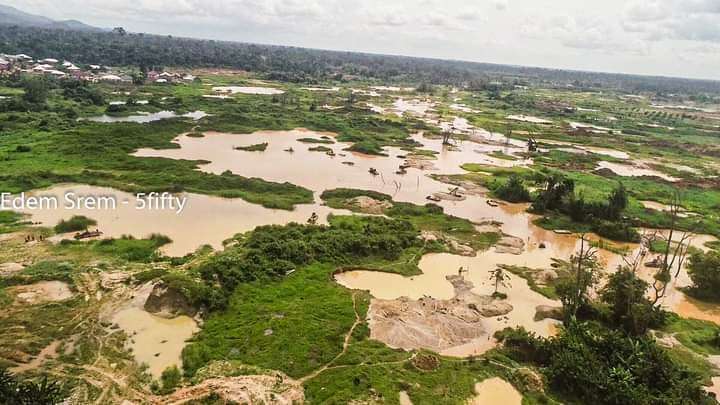Illegal mining, or galamsey, has become an ever-present menace in Ghana, wreaking havoc on the country’s natural resources, including its rivers, forests, and fertile lands.
However, the devastating effects of galamsey in the expert view are more than just environmental. According to Dr Ohene Aku Kwapong, founder and Managing Partner of The Songhai Group, the galamsey phenomenon reveals a deeper, systemic problem rooted in the nation’s cultural mindset toward nature—a longstanding disregard that has permeated the collective consciousness of Ghanaians.
Dr Aku Kwapong, who also doubles as a Fellow at the Ghana Centre for Democratic Development (CDD-Ghana) argued that at the heart of the galamsey crisis lies a cultural inertia that values exploitation over conservation.
He pointed out that this attitude is not a recent development but is reflective of how Ghanaians have historically viewed the environment: as something to be mined, harvested, and consumed, rather than nurtured or preserved.
“The perception that nature is something to be exploited rather than preserved has led to a cycle of abuse, from deforestation to illegal mining, and this perception is tragically common among Ghanaians.
“A survey of 1,150 randomly selected citizens highlighted a troubling lack of concern for environmental conservation, showcasing the extent to which this mindset pervades society..)”.
Ohene Aku Kwapong (PhD), founder and Managing Partner of The Songhai Group and Fellow at the CDD-Ghana
He further indicated that the data revealed that a staggering 83% of the population believes that laws protecting the environment do not apply to them—a mentality that perpetuates corruption, non-compliance, and the erosion of the rule of law.
Harmful Mindset Creating Cycle of Abuse
According to Dr Aku Kwapong, this harmful mindset has created a cycle of abuse, from deforestation to illegal mining, that has gone largely unchecked.
He noted that environmental destruction caused by these practices has been devastating, yet the urgency to protect Ghana’s natural resources has consistently come from external forces rather than domestic action.
“Ghanaians have frequently allowed external forces to dictate when to stop environmental abuse. Slavery itself, with its horrific exploitation of human beings as resources, was another reflection of this detachment from both human dignity and the environment. In all these cases, it was not the domestic realization that halted the destruction, but external intervention.”
Ohene Aku Kwapong (PhD), founder and Managing Partner of The Songhai Group and Fellow at the CDD-Ghana
Personal Gains over National Interest
Galamsey, Dr. Kwapong argued, is merely the latest expression of this cultural mindset, where immediate personal gain is prioritized over the long-term sustainability of the environment.
He stated that Ghanaians’ tendency to bend or negotiate laws amplifies this problem, with personal relationships and contextual flexibility often outweighing legal regulations.
This according to the Ghana Centre for Democratic Development Fellow has given rise to a culture of impunity, where the exploitation of natural resources is rampant, and the damage is borne disproportionately by the most vulnerable members of society.

Dr Aku Kwapong opined that the most powerful elites, insulated from the consequences, benefit from galamsey’s profits while rural communities suffer from poisoned water, eroded soils, and devastated ecosystems.
“The environmental cost of galamsey is staggering, with rivers poisoned, landscapes ravaged, and ecosystems destroyed. However, the ultimate cost extends far beyond the physical damage to the land. The destruction of natural resources threatens the very survival of communities that depend on clean water, fertile soil, and sustainable ecosystems for their livelihoods.
“The economic toll is significant, as the depletion of natural capital undermines long-term development, while the health implications—ranging from water contamination to respiratory illnesses—add further strain to an already burdened healthcare system.”
Ohene Aku Kwapong (PhD), founder and Managing Partner of The Songhai Group and Fellow at the CDD-Ghana
Systemic Corruption Eroding Ghana’s Social Fabric
Additionally, Dr Aku Kwapong pointed out that the true cost of galamsey extends far beyond environmental and economic damage.
He strongly posited that the systemic corruption and disregard for environmental laws have eroded Ghana’s social fabric, fostering inequality, weakening the rule of law, and deepening the divide between the rich and poor.
In this climate, he noted that might often make right, and personal gain is valued over the common good, asserting that the breakdown in governance has undermined trust in public institutions, creating a culture where laws are selectively enforced, and accountability is the exception rather than the rule.
But, as Dr. Kwapong emphasized, the environmental crisis Ghana faces is symptomatic of a broader cultural issue—one that requires a radical shift in how Ghanaians view their relationship with the environment.
According to him, until this fundamental change occurs, the cycle of environmental degradation and social decay will persist.
He urged Ghanaians to begin to see themselves not as exploiters, but as stewards of the land, responsible for its preservation for future generations, adding that this cultural shift is crucial, not only for the environment but for the survival and future prosperity of the nation itself.
“The challenge is immense, but the stakes are too high to ignore. It is not just the land that is at risk, but the future of the nation itself”, Dr Aku Kwapong concluded, underscoring the need for Ghanaians to act against illegal mining or perish.
From the foregoing, if Ghana continues down this path, the consequences will be catastrophic—not just for the environment, but for the country’s economy, social cohesion, and future generations as clearly stated by Dr Aku Kwapong.
The time to act is now, and it starts with changing the way Ghanaians think about and interact with nature. Galamsey is not just an environmental issue; it is a reflection of a cultural crisis that must be addressed if the nation is to secure a sustainable and prosperous future.
READ ALSO: Jill Biden To Launch 5-Day Campaign Tour For Harris Campaign






















